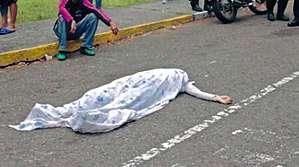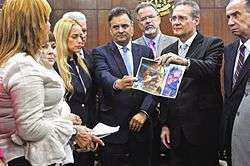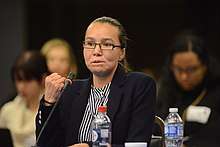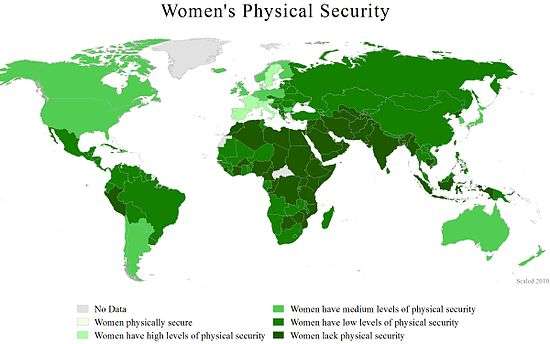Violence against women in Venezuela
Violence against women in Venezuela occurs in Venezuela.[1] With corruption and the crisis in Venezuela, offenders are not being prosecuted.[2] In 2014, only 0.7% of the official complaints of violence towards women resulted in trials.[2] There is a United Nations database on Violence against women in Venezuela.

Obstacles
Crisis in Venezuela

Mejía has said that the current crisis in Venezuela has contributed to increases not only in the direct physical violence towards women in the nation, but also to indirect violence. This indirect violence appears in multiple ways for multiple reasons. Healthcare in Venezuela is, as Mejía describes, a "luxury", and women are increasingly unable to care for children without this support - because of this, "[m]ore and more Venezuelan women are even opting to be sterilized". Mejía also says that the poor economy and migrant crisis means women are being forced into selling sex and, from this, "are vulnerable to sex trafficking". She states that "The crisis has made Venezuela’s women much more vulnerable than men, more vulnerable to poverty, to neglect by the state, and especially to violence".[4]
Objectification
| External video | |
|---|---|
Due to the rise of the beauty pageant industry, Venezuelan women have become highly regarded as objects of beauty and sexuality. Esther Pineda, a Venezuelan women's studies expert, stated that the popularity of Miss Venezuela and other pageants in Venezuela reveals how the country is "deeply sexist".[5] Despite controversies facing Miss Venezuela, the Me Too movement has not carried any significance in Venezuela.[5] According to Pineda, in Venezuela “[p]hysical beauty is seen as a value. ... And it’s given more importance than any other attribute".[5]
Miss Venezuela
Miss Venezuela contestants may be subject to prostitution and sexual exploitation. Young contestants are passed to powerful individuals in Venezuelan society for sexual favors. In a poverty-filled country, vulnerable women turn to wealthy individuals for funds. With participation often costing tens of thousands of United States dollars, these participants perform sexual favors for their wardrobe, cosmetic surgery, photo shoots and for sponsorships in order to "create the illusion of 'perfect' beauty" that is held in esteem in Venezuelan culture. Some contestants allegedly involved in such acts include Miss Venezuela 1989 participant Patricia Velásquez and Miss Venezuela 2006 runner-up Claudia Suárez.[6][7][8][9][10][11]
As the crisis in Bolivarian Venezuela worsened, Venezuelan women have relied on the pageant to find a way out of the poverty-stricken country.[5]
Statistics
The Venezuelan government does not provide reliable statistics regarding violence against women in the country.[2] However, the Committee on the Elimination of Discrimination against Women stated in 2014 that violence directed towards women was "widespread and on the rise" in Venezuela.[2]
Through 2017, there was still government "hesistancy to release health data on maternal and infant mortality rates, which [...] are increasingly dire", and with it also being noted that Venezuela "has an increasingly dismal transparency record when it comes to public information on the rates of violence and abuse". The Venezuelan Women's and Human Rights expert Luz Patricia Mejía stated that this all "makes it difficult, if not impossible, to create accurate national figures."[4]
A periodic review by the UN in 2011 did note that "[c]ourts specializing in [...] preventing violence against women" in the country "had resolved 134,492 issues since 2008". Though, it explained that 85% of these issues were resolved by "conciliation mechanisms that included oral procedures and mandatory mediation", or therapy.[12]
Sex trafficking networks between Venezuela and Trinidad and Tobago increased in the 2010s, with Venezuelan women being sold for hundreds of dollars to buyers based in Trinidad and Tobago, allegedly with the support of Venezuelan authorities.[13] Venezuelan women deported from Trinidad and Tobago occasionally state that they were not there out of free will and were victims of sex trafficking.[13]
Law

In 2007, the country enacted Ley Organica Sobre el Derecho de las Mujeres a una Vida Libre de Violencia (Organic Law on the Right of Women to a Life Free of Violence).[14] Linda Loaiza, a women raped and tortured in 2001, was ignored by 59 different judges and had court hearings delayed 38 times over the span of seventeen years.[2] The government also disregarded the American Convention on Human Rights in 2012, allowing them to ignore the jurisdiction of this, and related, bodies.[15] The 2007 Organic Law was updated in 2014 to include provisions for femicide, after campaigns in the country.[16]
The Organization of American States hosts an in-house agency, MESECVI, "for the promotion and protection of women’s rights and gender equality". Its current technical director, the Venezuelan Luz Patricia Mejía, has said that "there is not yet a culture of justice for women". Mejía used to serve as a rapporteur for Women’s Rights at, and as Commissioner and President of the Inter-American Commission of Human Rights.[4]
A report initiated in Spain determined that, though "[c]ompared to other countries in the region, Venezuela has one of the more advanced legislations, being one of few to have broadened the focus of gender-based violence legislation to the areas of migration, trafficking and conflict and crisis situations", it is still a fact that "only 5 percent of the lawsuits filed by women in Venezuela end in sentences that favor their rights".[4]
A United Nations report in 2014 noted "with concern" that though there had been "the establishment of the National Commission for Gender Justice", "many women have no effective access to justice, in the absence of effective strategies aimed at facilitating such access". Similarly to Mejía's belief above, the UN were "deeply concerned" about "the persistence of patriarchal attitudes and deep-rooted stereotypes" in Venezuelan society and culture. This culminated with the report's greatest concern: that despite laws implemented to protect women, "violence against women and girls is widespread and on the rise".[15]
"Peace Begins at Home"
According to Venezuelanalysis, a pro-Bolivarian Revolution website,[17][18] after the murder of activist Sheila Silva in October 2017, when she was attacked and then thrown from her eleventh-floor apartment by her partner, the Vice-Minister for the Protection of Women's Rights, Rebeca Madriz, started a movement that lasted until the beginning of December that year. The movement included an anti-domestic violence campaign called "Peace Begins at Home: No More Violence against Women", often shortened. Madriz confirmed in November 2017 that "gender-based and domestic violence continues to be a serious issue in Venezuelan society despite laws". The movement hoped to target this through having "various public landmarks lit up in violet light by night" in an effort to prompt discussion about issues of women's rights.[16] The website has also stated that during this movement, Jorge Rodríguez vowed to encourage the Constituent National Assembly "to write the protection of women’s rights into the new constitutional draft", and that Sheila Silva's partner, Ángel José Mosqueda, was the first person in Venezuela to stand trial under the new definition of femicide. Silva had been on Rodríguez' mayoral campaign team.[16]
International recommendations
The 2011 UN review notes that Bangladesh "asked about initiatives to fight against gender violence" in Venezuela, with Thailand recommending that Venezuela "[i]mplement the [...] 'Bangkok Rules'", Vietnam that they "[a]ttach more importance to the protection of social vulnerable groups, including women". Canada, Myanmar, Cambodia, Angola and Sri Lanka recommended that Venezuela continue to pursue expanding women's rights and protections. Indonesia specifically called on the country to "[i]ntensify efforts to promote and protect women's rights, particularly in regard to gender based violence", and Slovenia said that they should "[t]ake all the necessary measures to eliminate violence against women, also by ensuring that perpetrators of such violence are prosecuted and punished, as well as by abolishing the stereotypical attitudes and patriarchal patterns of behaviour that undermine women's human rights".[12]
References
- "Inequality - Violence against women - OECD Data". theOECD. Retrieved 2019-07-02.
- Zuñiga, Mariana (2018-02-06). "American court opens historic hearing into Venezuela rape and torture case". The Guardian. Retrieved 2018-08-15.
- "Geraldine Moreno: Venezuelan Soldiers Mangled Her Face". PanAm Post. 11 February 2015. Retrieved 11 September 2015.
- "Women in Venezuela suffer greater human rights violations". Humanosphere. Retrieved 2018-08-21.
- "In beleaguered Venezuela, young women use beauty pageants to escape poverty". NBC News. Retrieved 2018-07-07.
- "Patricia Velásquez confiesa que se prostituyó para ingresar al Miss Venezuela". Diario La Prensa (in Spanish). Retrieved 2018-03-17.
- "¿Cuánto vale una Miss Venezuela?". Climax. 2015-10-14. Retrieved 2018-03-17.
- Lozano, Daniel (15 March 2018). "Miss Venezuela, envuelto en una trama de prostitución que involucra al chavismo". La Nación (in Spanish). Retrieved 2018-03-17.
- Mozo, Ana Carolina Griffin, Reynaldo (12 November 2017). "Miss Venezuela Pageant: Saints and Beauty Make Toxic Mix". Organized Crime and Corruption Reporting Project. Retrieved 2018-03-17.
- "Cisneros Suspends Miss Venezuela Pageant After Corruption Scandal". 2019-07-01. Retrieved 2019-07-02.
- "Scandal temporarily halts Miss Venezuela". 2018-03-22. Retrieved 2019-07-02.
- "Report of the Working Group on the Universal Periodic Review: Venezuela (Bolivarian Republic of)" (PDF). United Nations General Assembly Human Rights Council Nineteenth session. Retrieved 2018-08-22.
- Herrera, Isayen (2 June 2019). "Mujeres como mercancía, un viejo secreto entre Venezuela y Trinidad". armando.info. Retrieved 2019-06-02.
- http://venezuela.unfpa.org/doumentos/Ley_mujer.pdf
- "Concluding observations on the combined seventh and eighth periodic reports of the Bolivarian Republic of Venezuela" (PDF). United Nations Convention on the Elimination of All Forms of Discrimination against Women. Retrieved 2018-08-22.
- "Venezuelan Women's Movements Demand Justice for Femicide of Activist". Venezuelanalysis. Retrieved 2018-08-22.
- "Tackling Institutions One By One: An Interview With Gregory Wilpert".
Gregory Wilpert said that Martin Sanchez worked on the 'technical side' of setting up Venezuelanalysis. ... the main success of Venezuelanalysis.com has been that it provides a left social movement perspective on the Bolivarian Revolution in the English language. It's a fairly rare perspective, in that it is clearly pro-Bolivarian Revolution,
Also available at Znet. - Wilpert, Gregory (13 January 2012). "Obama's State Department Now Takes Cues from Right-Wing Cubans on Venezuela". Venezuelanalysis.com. Retrieved 9 May 2012.
